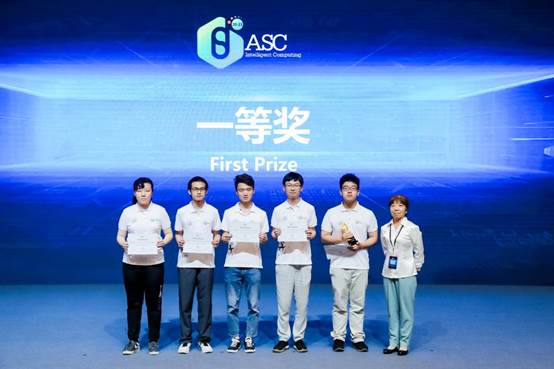On May 12th, the finals of the ASC Student Supercomputer Challenge (ASC20-21) came to an end at Southern University of Science and Technology, Shenzhen. The "Heptagon" team of HUST undergraduates won the global first prize. The team members: Shi Tianshuo, Wang Zhengru, Zhu Jiamin, Zhao Yunfei, and Fan Chenghao came from the School of Computer Science and Technology, and the School of Cyber Science and Engineering. The team instructor was Professor Shi Xuanhua from the School of Computer Science and Technology.

ASC, initiated by Asian country, is the world's largest supercomputer competition for college students. More than 300 university teams, from all over the world, signed up for ASC20-21, with 28 teams advancing to the finals. As the first international student supercomputer challenge that resumed its offline competition during the epidemic, ASC20-21 adopts an innovative competition system combining on-site competitions and online competitions. 21 college teams from Chinese mainland participated in the on-site competition, and 7 universities from outside the Chinese mainland participated in the online competitions - through the cloud platform.

The finals require all teams to design and build supercomputing systems under 3000 watts of power consumption as well as meet the following criteria. These include: run and optimize international benchmark tests; artificial intelligence of natural language understanding; pulsar search PRESTO; quantum computing simulation QuEST; and mysterious applications of cross-scale prediction model MPAS-A – as well as other cutting-edge science and engineering applications. During the finals, the 28 teams also completed the super team competition according to the draw, and through cross-team and cross-regional cooperation, they jointly challenged VENAS, the prediction question of the evolution of COVID-19. In the end, the joint team composed of HUST, Northwestern Polytechnical University, Tsinghua University and the Ural Federal University of Russia performed well in the VENAS, winning the Super Team Award.
During the first two days, the team members completed the installation and construction of all hardware environments, software platforms, compilers, high-speed networks, operating systems, and operating environments. This competition uses the latest top equipment such as 200G HDR IB, A100 GPU, intel iceLake-SP CPU. With the enhancement of equipment performance, its power consumption and heat dissipation performance characteristics have been greatly advanced. Faced with unfamiliar hardware, the team members set up a test environment and conducted experiments at the fastest possible speed to measure the approximate performance-power consumption curve of each component. With reference to the characteristics of each application tested in the school before, they chose a specific cluster configuration. On the last day, some applications were tested and optimized for the platform in advance.
During the last two days of the competition, the team members ran the optimized applications on the cluster in advance. In the HPL and HPCG benchmark tests, the team members accurately adjusted the parameters to balance power consumption and heat dissipation as well as CPU and GPU computing power. In the HPCG benchmark test, the team ranked second with 1886.52Gflops. For PRESTO, the team optimized the pulsar search program and used the combination of MPI and openMP to achieve multi-machine and multi-core parallelism, winning third place. For QuEST quantum computing simulation program, the team members used NCCL communication library to expand single-card GPU to multi-level multi-card, and their use of UVA unified memory model solved the limitation of video memory on scalability. For LE level 4 and level 6 challenges, the team members analyzed the models issued on the spot, and trained on the on-site cluster , with regard to both accuracy and speed.
In the team application competition, all teams were randomly divided into 7 super teams, with the applications to be analyzed and optimized within two days. In the competition, the team composed of our university, Northwestern Polytechnical University, Tsinghua University, and Ural Federal University in Russia adopted C language rewriting and multi-threaded parallel application hotspots in solving VENUS. Also, they used ramdisk to optimize IO and other methods to improve their performance by more than 10 times, winning the Super Team Award.
There are three top international supercomputer competitions: ASC, ISC, and SC. The team under the guidance of Professor Shi Xuanhua has won the global Best Performance Award and the global championship of this series in 2013 and 2016, respectively - twice breaking the world record for Best Performance.
Written by: Hu Zhenxiang
Edited by: Zhang Aoyi, Scott, Peng Yumeng
